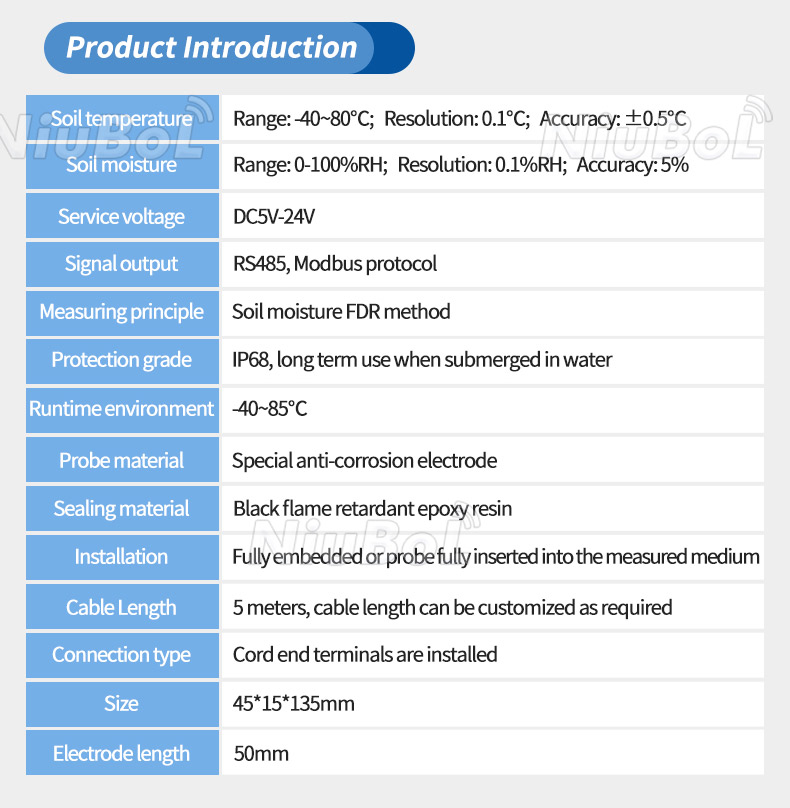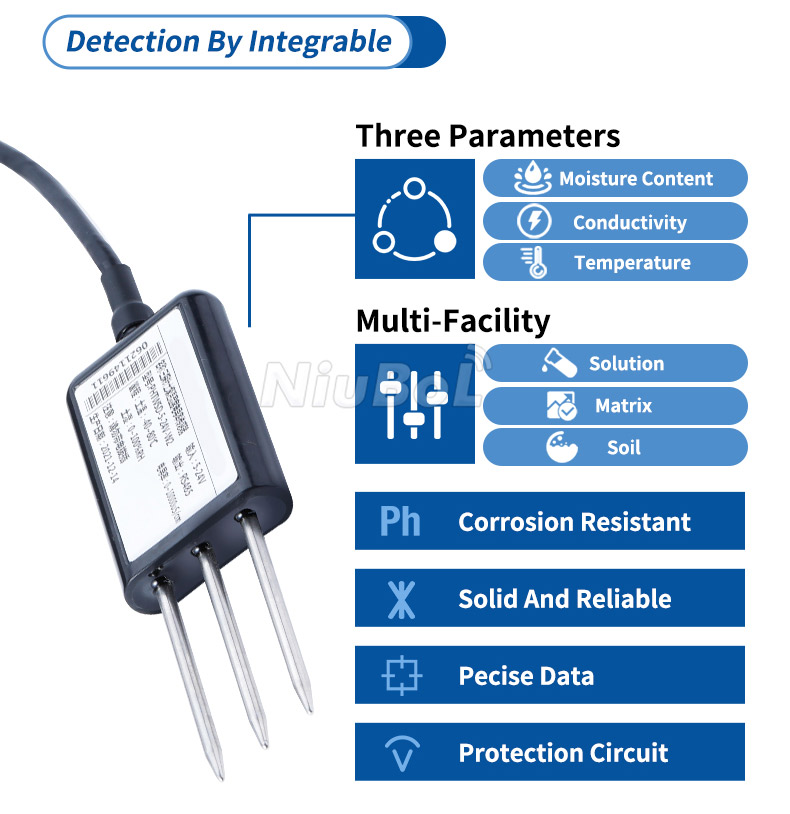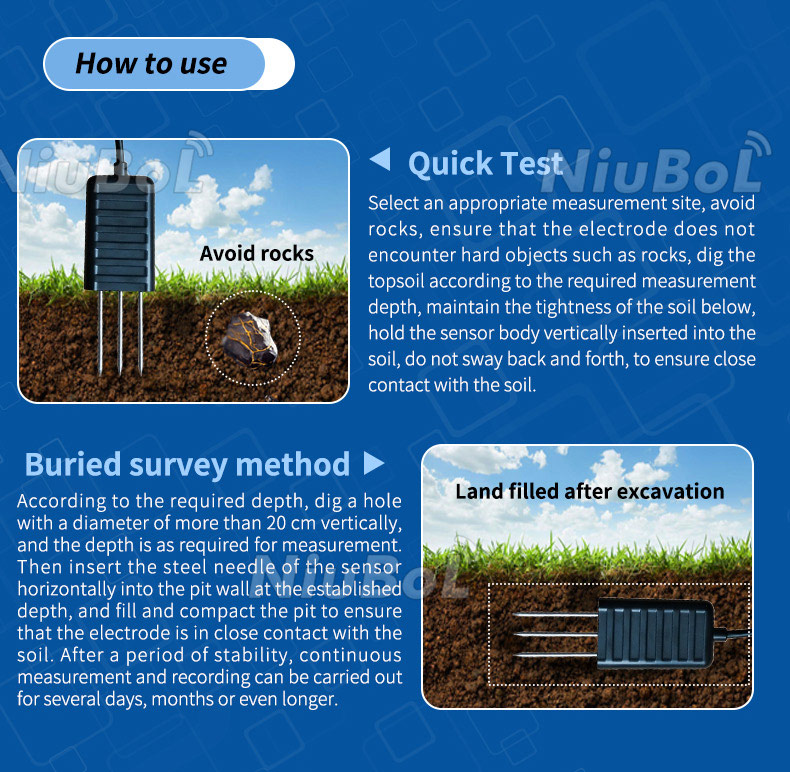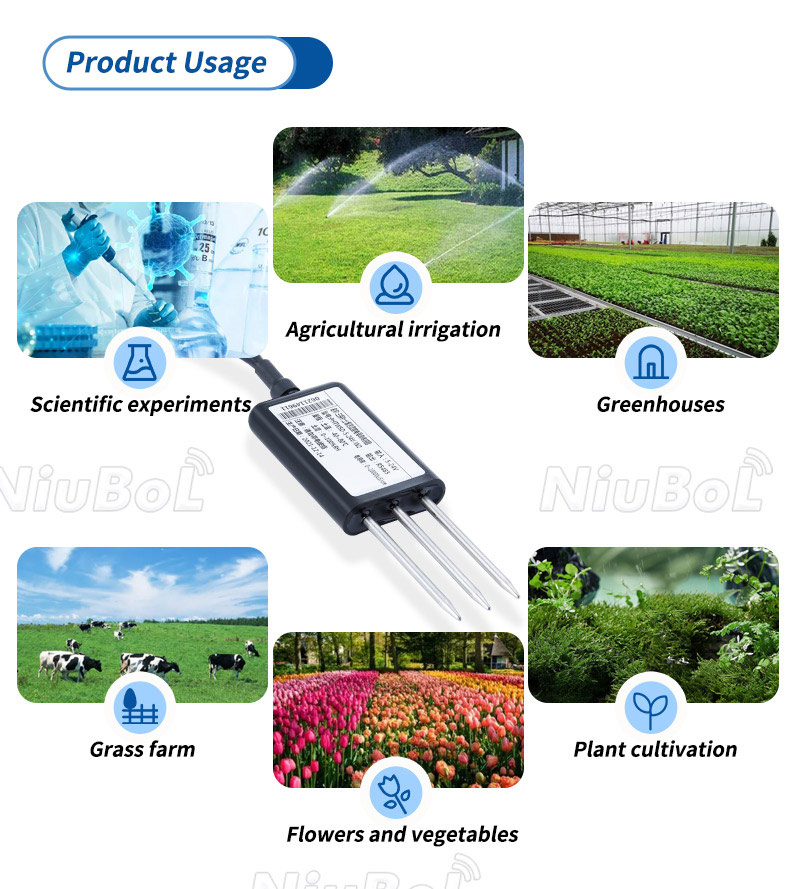

— Blogs —
—Products—
 Consumer hotline +8618073152920
Consumer hotline +8618073152920 WhatsApp:+8615367865107
Address:Room 102, District D, Houhu Industrial Park, Yuelu District, Changsha City, Hunan Province, China
Product knowledge
Time:2024-07-14 17:37:28 Popularity:2968
A soil electrical conductivity sensor(soil ec sensor ) is a device used to measure the electrical conductivity of soil and works on the basis of the electrical conductivity of the ions in the soil. It is an important technology in farmland management and water resource monitoring. Soil conductivity is a measure of the electrical conductivity of the soil, which reflects the amount of charged particles in the soil, and is mainly related to factors such as the humidity, temperature and salt content in the soil. It is often used to reflect the content of dissolved substances in the soil and the level of salinity.
In modern agricultural production, soil electrical conductivity sensors can help farmers to understand the electrical conductivity of the soil, so as to assess the salinity status of the soil, the soil humidity and the level of dissolved salts in the soil. This information is important for rational fertiliser application, irrigation management and prevention of soil salinisation. By monitoring soil conductivity, fine management of farmland can be realised, agricultural productivity can be improved and resource waste can be reduced.
Detailed explanation about Soil electric conductivity sensor:
Soil Electrical Conductivity Sensor Definition and Function
Definition: Soil conductivity sensor reflects the information of soil moisture content, salt content and soil texture by measuring the electrical conductivity in the soil. Conductivity is the ability of the soil to pass electric current through it and is an indicator of the concentration of ions in the soil.
Function: By measuring soil electrical conductivity, it is possible to understand the level of salinity and moisture in the soil, which in turn guides the irrigation and fertilisation of crops, assesses the quality of the land, and monitors the state of the environment.
Soil electrical conductivity sensor working principle
Soil conductivity sensors use two or more electrodes to introduce an electric current into the soil and measure the strength of the current through the soil. The conductivity in the soil is primarily affected by the moisture and dissolved ion concentrations in the soil. In general, the higher the moisture and ion concentration, the higher the conductivity.

When selecting a soil electrical conductivity sensor, it is often necessary to consider the soil type, the depth of measurement, the environmental conditions, and the compatibility of the data acquisition system. These sensors are important for soil management and research in modern agriculture and environmental science, providing valuable soil information to decision makers and researchers.
Technical characteristics of soil electrical conductivity sensors
Accuracy: Soil electrical conductivity sensors are capable of measuring electrical conductivity in the soil with high accuracy, providing accurate information on soil quality.
Real-time: the sensor can monitor the moisture and salt content in the soil in real time, helping farmers keep track of soil conditions.
Automation: Sensors can be connected to computers or mobile devices to automatically record, display and analyse data, reducing the tediousness and errors of manual operation.
Durability: The sensors are usually made of durable materials, such as ABS engineering plastics, with good sealing and corrosion resistance, and can be buried in the soil for a long time.
- Accuracy and sensitivity: able to accurately measure conductivity in different soil types and moisture conditions.
- Real-time monitoring: Provides instantaneous soil conductivity data to aid decision-making and management.
- Data logging and analysis: Often able to log and store data for subsequent analysis and reporting.

Soil electrical conductivity sensor application areas
Soil conductivity sensors are used in a wide range of agricultural and environmental applications, including but not limited to:
Agricultural production: for monitoring soil salinity levels to help determine suitable crop planting or irrigation management strategies to improve water use efficiency and crop yields.
Environmental monitoring: to assess soil quality and pollution levels, especially in industrial areas or around emission sources.
Scientific research: to provide basic data support for soil quality in scientific experiments, plant cultures, etc.
- Hydrology: for the study of interactions between soil and groundwater, e.g. in hydrological modelling.
In addition, soil electrical conductivity sensors can also be used for environmental monitoring, for example, in the fields of urban green belt management, sewage treatment and ecological restoration, to help the relevant departments keep abreast of the soil environmental conditions and provide data support for environmental protection and ecological restoration.

Future Development
With the development of science and technology, soil electrical conductivity sensor is expected to further improve the accuracy and intelligence level. For example, by integrating more sensors and algorithms, more comprehensive soil quality monitoring and more accurate agricultural production guidance can be achieved. At the same time, the miniaturisation and portability of the sensors will make them easier to use in various environments.

In summary, soil electrical conductivity sensors are an important agricultural and environmental monitoring tool, providing soil quality information by measuring soil electrical conductivity, and providing strong support for agricultural production and environmental protection.
NBL-S-TMC-Soil-temperature-and-moisture-conductivity-sensor.pdf
Related recommendations
Sensors & Weather Stations Catalog
Agriculture Sensors and Weather Stations Catalog-NiuBoL.pdf
Weather Stations Catalog-NiuBoL.pdf
Related products
 Combined air temperature and relative humidity sensor
Combined air temperature and relative humidity sensor Soil Moisture Temperature sensor for irrigation
Soil Moisture Temperature sensor for irrigation Soil pH sensor RS485 soil Testing instrument soil ph meter for agriculture
Soil pH sensor RS485 soil Testing instrument soil ph meter for agriculture Wind Speed sensor Output Modbus/RS485/Analog/0-5V/4-20mA
Wind Speed sensor Output Modbus/RS485/Analog/0-5V/4-20mA Tipping bucket rain gauge for weather monitoring auto rainfall sensor RS485/Outdoor/stainless steel
Tipping bucket rain gauge for weather monitoring auto rainfall sensor RS485/Outdoor/stainless steel Pyranometer Solar Radiation Sensor 4-20mA/RS485
Pyranometer Solar Radiation Sensor 4-20mA/RS485
Screenshot, WhatsApp to identify the QR code
WhatsApp number:+8615367865107
(Click on WhatsApp to copy and add friends)
